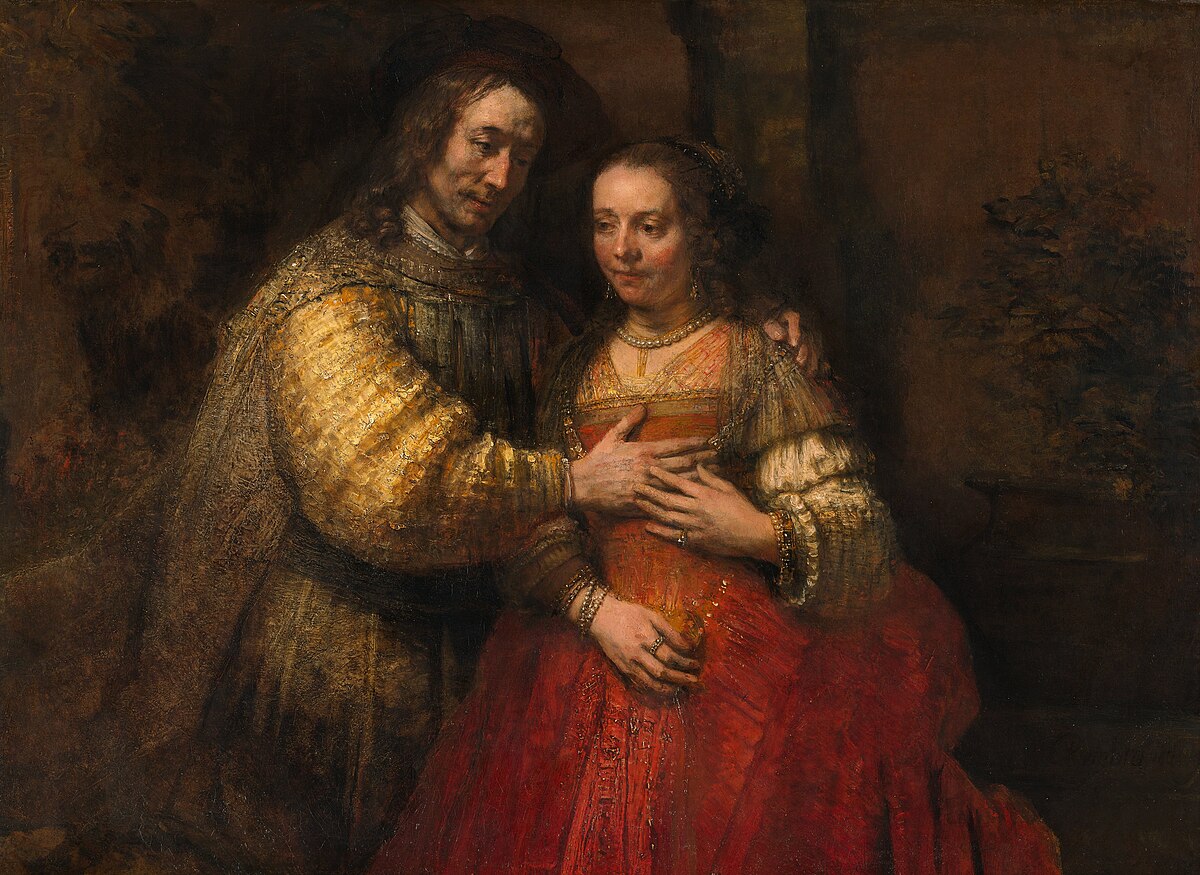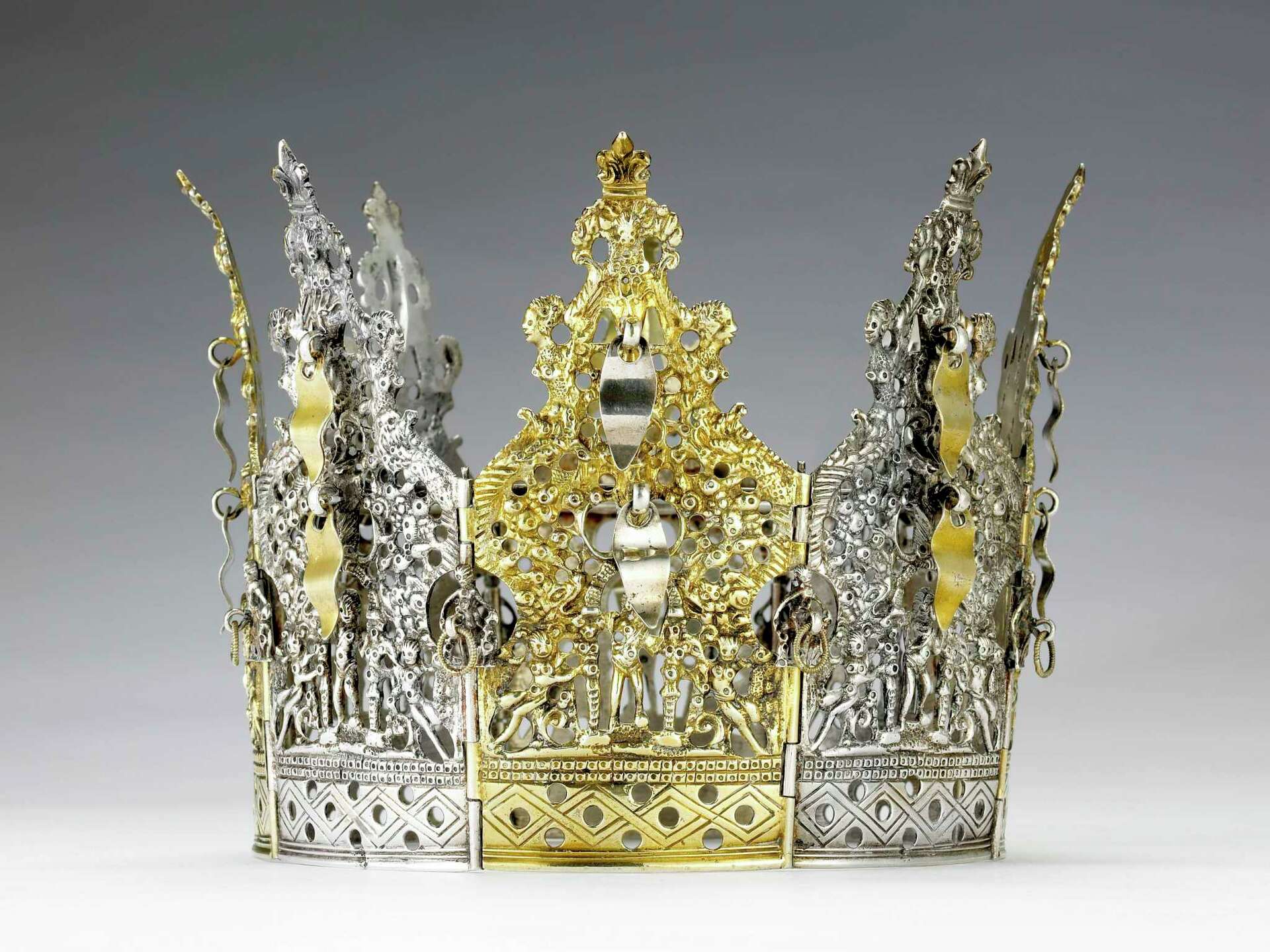The Advent Project: Week 5預覽

Dec 31: The Coronation of the Bridal Couple

The Jewish Bride, Rembrandt Harmenszoon van Rijn c. 1665–1669. Oil on canvas, 121.5 × 166.5 cm. Rijksmuseum, Amsterdam. Public domain.

Bridal Crown, 1590–1610. Silver and silver gilt. Christen Sveaas Collection, Norway. Public Domain.
“Psalm 45—A Noble Theme.” Performed by Hal Leonard Singers and the Shawnee Press Church Choral. Composed by Heather Sorenson.
Poetry:
“Marriage Blessing”
by Jane Hirshfield
Today when persimmons ripen
Today when fox-kits come out of their den into snow
Today when the spotted egg releases its wren song
Today when the maple sets down its red leaves
Today when windows keep their promise to open
Today when fire keeps its promise to warm
Today when someone you love has died
or someone you never met has died
Today when someone you love has been born
or someone you will not meet has been born
Today when rain leaps to the waiting of roots in their dryness
Today when starlight bends to the roofs of the hungry and tired
Today when someone sits long inside his last sorrow
Today when someone steps into the heat of her first embrace
Today, let this light bless you
With these friends let it bless you
With snow-scent and lavender bless you
Let the vow of this day keep itself wildly and wholly
Spoken and silent, surprise you inside your ears
Sleeping and waking, unfold itself inside your eyes
Let its fierceness and tenderness hold you
Let its vastness be undisguised in all your days.
THE CORONATION OF THE BRIDAL COUPLE
When we think of kings and queens, most of us naturally imagine the British Royal Family, one of the last to practice the spectacular pageantry of a bygone era. At the coronation of a British monarch, millions of people around the world tune in to watch the thousand-year-old ceremony. The pinnacle of this investiture is the Archbishop of Canterbury anointing the king or queen with holy oil (taken from 1 Kings 1:38-50 where Zadok the Priest anointed King Solomon) and placing the crown, a symbol of power and authority, on the monarch’s head.
Not only are monarchs associated with the wearing of crowns, but in various cultures around the world the crown is a significant symbol used in wedding ceremonies. In Northern European cultures since Roman times, brides have worn intricate gold and silver wedding crowns, an indication of their virginity and purity. In Eastern Orthodox ceremonies, the Crowning Service or Coronation, is the climax of the wedding. The priest places simple crowns (often joined together with ribbon) on the bride and groom’s heads as he sings, “Lord our God, crown them with glory and honor.” The couple is crowned king and queen of their newly formed home where they hope to live in integrity and love before God. Their little kingdom becomes enfolded into the macrocosmic Kingdom of God. Wedding crowns also reference the “crown of righteousness” (2 Timothy 4:7-8), an eternal reward for holy living, as well as “crowns of martyrdom,” an indication that marriage requires endless self-sacrifice.
Our son just announced his engagement to a young woman we think of in the most affectionate and esteemed way. It’s a time of great rejoicing for our family as we anticipate the soon approaching day when they will be “crowned” husband and wife. There is much to prepare. Details regarding the guests, the gifts, the finery, the ceremony, and the reception all need to be carefully thought through. It’s a monumental task as weddings are one of life’s peak events, which moves those involved to make it as memorable as possible for the special couple. Our Scripture passage for today is a wedding hymn written for a royal bride and groom on the occasion of their marriage. Some scholars speculate the couple described is King Solomon and the Princess of Egypt. Whatever the original event or recipients, today Psalm 45 is a popular inclusion at both Jewish and Christian weddings.
We don’t have to read very far before we realize that the king and groom in this song of praise focuses on someone who is more than human. He’s described as beautiful, righteous, courageous, and mighty. “You are fairer than the sons of men; grace is poured upon Your lips; therefore God has blessed You forever. Gird Your sword upon Your thigh, O Mighty One, with Your glory and Your majesty. And in Your majesty ride prosperously because of truth, humility, and righteousness” (Psalm 45:2-4). In John’s Book of Revelation, the Evangelist echoes the Bridegroom’s character qualities, “Behold, a white horse. and He who sat on him was called Faithful and True, and in righteousness He judges and makes war. His eyes were like a flame of fire, and on His head were many crowns. . . and He has on His robe and on His thigh a name written: KING OF KINGS AND LORD OF LORDS. And likewise in the book of Hebrews, Psalm 45 is referenced, “But to the Son He says: ‘Your throne, O God, is forever and ever; A scepter of righteousness is the scepter of Your kingdom. You have loved righteousness and hated lawlessness; Therefore God, Your God, has anointed You with the oil of gladness more than Your companions.’”
While the first half of Psalm 45 describes the king, the second half focuses on his bride. At any wedding the bride is the center of attention. There are moving, online videos show young, awestruck grooms tearing up the moment they see their beloved coming down the aisle. “So the king will greatly desire your beauty” (Psalm 45:11). Rembrandt’s lush painting,The Jewish Bride, brings to mind the glorious “royal daughter” who is brought “with gladness and rejoicing” to the King “in robes of many colors” (Psalm 45: 13-15). This beautiful wife, the Church of Christ, “has made herself ready for the marriage of the lamb” (Revelation 19:7).
Crowns from earthly occasions are pale metaphors that point to a much grander eternal scenario. It seems that preparations for the heavenly wedding of Christ and His bride are underway. With eagerness those who are His, long for the quickening of that glorious day when “every knee shall bow” and Christ is fully acknowledged and crowned “King and Lord of All!” Then He will reign forever and ever with His beloved wife in the culmination of all things. Meanwhile, “We all, with unveiled faces, continually seeing as in a mirror the glory of the Lord, are progressively being transformed into His image from [one degree of] glory to [even more] glory, which comes from the Lord, [who is] the Spirit” (2 Corinthians 3:18, Amplified Bible).
Prayer:
Lord and King of Creation,
We bow before You. To You belong all glory, honor, and praise. Open our hearts to Your divine character shining forth to us through love unfailing. Purify us to respond with love first to You and then overflowing to those around us.May the grace, beauty, and faithfulness in You bring the best forth in our fellowship and personal lives. Forgive us our shortcomings and lead us on to be renewed and transformed. Your righteousness and sacrifice call out to us, the beloved.As You first came to be born in Bethlehem, let us look for Your return as the eternal Kingdom is fulfilled.
Amen.
Beth Krammes
Alumna, Cook School of Intercultural Studies
Biola University
Barry Krammes
Professor Emeritus, Art Department
Biola University
For more information about the artwork, music, and poetry selected for this day, please visit our website via the link in our bio.
關於此計劃

Biola University's Center for Christianity, Culture & the Arts is pleased to share the annual Advent Project, a daily devotional series celebrating the beauty and meaning of the Advent season through art, music, poetry, prayer, Scripture, and written devotions. The project starts on the first day of Advent and continues through Epiphany. Our goal is to help individuals quiet their hearts and enter into a daily routine of worship and reflection during this meaningful but often hectic season. Our prayer is that the project will help ground you in the unsurpassable beauty, mystery and miracle of the Word made flesh.
More









